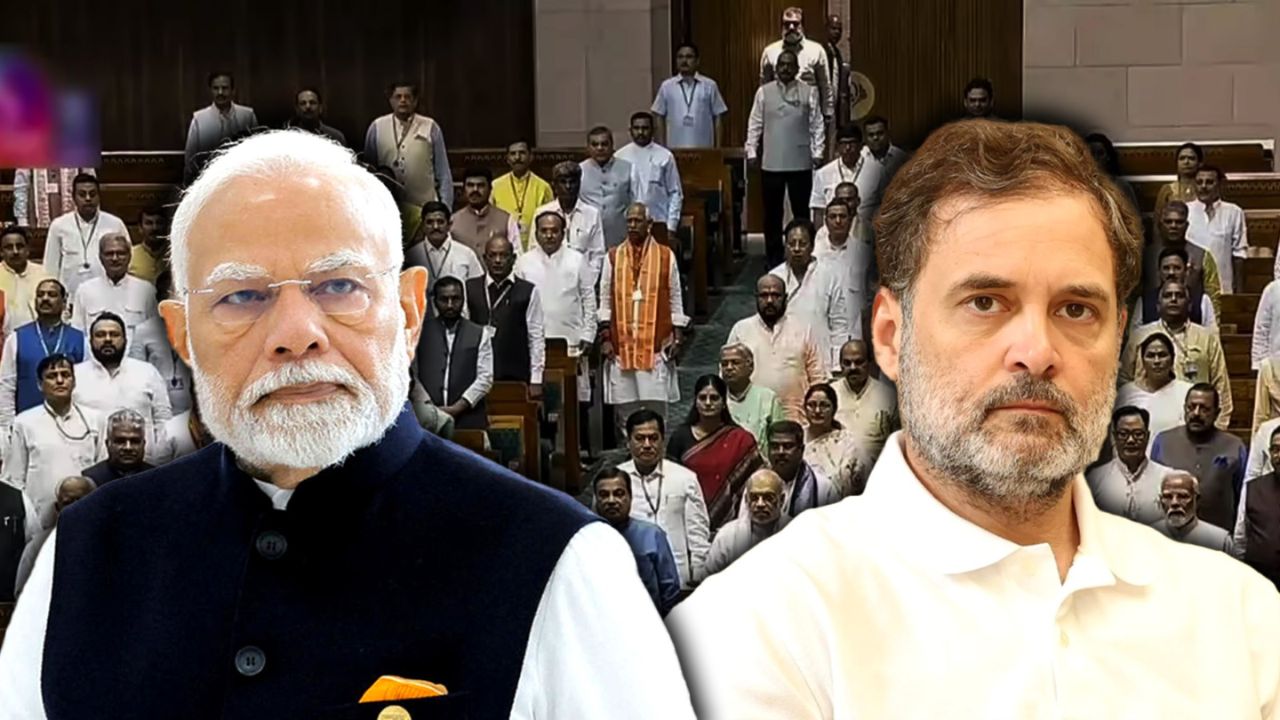 English
English

A total of 120 hours of work were scheduled for this session starting from 21 July to 21 August, but due to opposition’s protest, uproar, sloganeering and poster-bumping, Parliament worked only for 37 hours. Watch an exclusive analysis on this Parliement Session by veteran journalist Manoj Tibrewal Aakash

Tense atmosphere between Opposition and Government in Parliament
New Delhi: The Monsoon Session of Parliament was adjourned indefinitely on Thursday. Although this session was successful legislatively however it is being considered incomplete from the political and democratic point of view. This session became an example in the Parliamentary history of India that how legislative work was done, but the healthy dialogue and debate of democracy almost ended. Traditionally, Parliament has been a platform where there was open discussion and the opposition was heard, but now allegations and counter-allegations and noise are prevalent. This session took it to the extreme.
Senior journalish Manoj Tibrewal Aakash said in his show 'The MTA Speaks' that a total of 120 hours of work were scheduled for this session starting from 21 July to 21 August, but due to opposition's protest, uproar, sloganeering and poster-bumping, Parliament worked only for 37 hours. That is, about 83 hours of time was wasted. If seen from the economic point of view, about Rs 2.5 lakh is spent on one minute of proceedings in Parliament. This means that there was an economic loss of about Rs 125 crore in this session.
Still, the government got a total of 26 bills passed. Of these, 12 were passed by the Lok Sabha and 14 by the Rajya Sabha. But many bills were passed without any debate, to which the opposition strongly objected. The Income Tax Amendment Bill 2025, Tax Laws Amendment Bill, Merchant Shipping Bill, Indian Ports Bill, National Sports Operations Bill, National Anti-Doping Amendment Bill, Indian Institute of Management (IIM) Amendment Bill and Online Gaming Promotion and Regulation Bill were prominent in the Lok Sabha. There was a special controversy over the online gaming bill. At the same time, in the Rajya Sabha, the Indian Ports Bill and the amendment bill related to the establishment of a new IIM in Guwahati were considered important.
There was a tense atmosphere between the opposition and the government from the beginning of the session. The opposition demanded an immediate discussion on the terrorist attack in Pahalgam, Jammu and Kashmir and the Navy's Operation Sindoor, but the government later postponed it. This angered the opposition and sloganeering started in the House. This uproar continued for most of the days of the session.
The most controversy was about the Special Intensive Review (SIR) of Bihar. The opposition called it a preparation for electoral rigging and there was continuous sloganeering, poster-waving and walkout on this issue. Parliament proceedings also had to be adjourned several times. This issue of Bihar remained prominent throughout the session and other legislative work was affected.
In the last days of the session, Home Minister Amit Shah introduced three important bills. These included the 130th Amendment of the Constitution, Union Territory Amendment Bill and Jammu and Kashmir Reorganization Amendment Bill. These bills had a provision that if the Prime Minister, Chief Minister or any minister remains in custody for more than 30 days due to a serious crime, he will have to resign. The government said that this would eliminate crime from politics and curb corruption. The opposition called it a weapon of misuse of power and said that it would be used especially to put opposition leaders in jail. On this, the opposition tore copies of the bill in the House and protested strongly. Eventually the government had to agree to send this bill to the Joint Parliamentary Committee.
There was also a lot of controversy over the Online Gaming Promotion and Regulation Bill. The government said that this law would facilitate gaming in a safe environment to the youth and would control this industry. The opposition said that this will increase drug addiction and unemployment among the youth. Despite this, this bill was passed.
In this session, other bills related to Manipur Tax Amendment, Readjustment of Goa Assembly seats and National Sports Operations were also passed, but there was no deep discussion on these. The opposition alleged that the government is making Parliament a machine to pass laws and is ignoring debate.
The situation in Rajya Sabha was also similar to Lok Sabha. Walkouts, sloganeering and boycotts continued over Bihar SIR and other controversial bills. Many important bills were passed in the absence of the opposition, prominent among which is the Indian Ports Bill.
The biggest irony of this monsoon session was that the bills were passed, but democratic debate and the voice of the public almost disappeared. There was no concrete discussion on issues of public interest like inflation, unemployment, education, health and security. Parliament, which is the temple of democracy, has become an arena for political struggle.
Now the question is whether Parliament is really representing the voice of the people or has remained only a platform for confrontation between the ruling and the opposition. The government considers it a legislative success, while the opposition is calling it a session that is harmful to democracy. Experts are also warning that if there is no healthy dialogue and debate in Parliament, democracy will weaken. The real power of Parliament is not in passing laws, but in open and fair debate, which decides the direction of the country.
No related posts found.